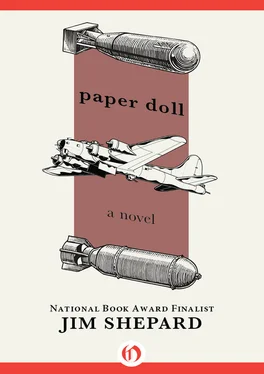“Oh, mince, mince,” someone said.
“And the length of the mission prevents any elaborate zigzagging or avoidance of these areas.”
“Some fucking colonel thought this one up,” Lewis breathed. “Some fucking desk-bound colonel of a bastard.”
“The Regensburg force is not coming back. They are going on to temporary airfields in North Africa. We, on the other hand, are going to turn around, and come back through those same defenses.” The crews were noisy with anxiety again. “The expectation is,” the major said, getting louder, “that the Regensburg people, going through before us, will catch most of it going in. And that we’ll catch all of it going out.”
The men sat. This was worse than they could have imagined. Bryant absorbed the information that followed with less than perfect concentration.
“We’ll be routed through that part of the German fighter belt with the greatest density of units, all capable of immediate or near-immediate response.” Snowberry bit his lip and winced. The sound carried. “Now the German units likely to come into action first will be the Gruppen of Jagdeschwader 1 and JG 26 stationed in Holland and northern France. There’s also evidence of the recent movement of units into this area— JG 2 and JG 11. There’s further evidence that JG 3 was pulled recently from the Russian front. We haven’t been able to locate it.” Bryant swept his hair back with both hands, both palms. “Now we should expect trouble from these airfields: Woensdrecht. München-Gladbach. Deelen. Leeuwarden, and Schiphol. We believe they won’t be at full strength, and we believe they won’t be well coordinated. They’ll use up valuable flying time, besides, trying to establish a height advantage and an up-sun position for attack. Gunners should be ready for the head-on stuff, and the stuff out of the sun. And pilots remember: they always look for the group with the loosest formation. They look for the raggedy-ass guys. You fly like assholes and they’ll shoot you a few more.”
He paused, and a few people coughed. “The toughest opposition should be between here and here — the coast and a point halfway to the target. After that, you should run into only a few twin-engined jobs, night fighters pressed into day work. It’s hoped that the interior will be largely empty of fighters.”
Bryant and Lewis looked at one another in amazement.
“Sir?” someone asked. “Doesn’t anybody know? ”
“Intelligence is sketchy on that score,” the major said. “All we have is our best guess.”
Lewis was in the blackest despair. “Shithouse mouse,” he said. “Look at that line. You know how many Gruppen that has to be? Every Kraut in the West has to have a shot at us. We’re going to fly over everyone but the Red Baron.”
“Now there’s plenty of fighter support, as far as that goes,” the major said. “Eight Spitfire squadrons from the RAF will take us as far as Antwerp and then turn us over to two P-47 groups that’ll take us all the way to Eupen.”
“All that way,” Lewis muttered. “Isn’t that a big deal.”
“They’ll pick us up around Eupen on the return. Questions?”
“What’re you worried about?” Piacenti whispered to Lewis. “We get fighter escort the whole way. Ours all the way to Eupen and theirs all the rest of the way.” Lewis snorted.
The room was quiet. The entire row of gunners ahead of Bryant had their arms crossed, and their heads sunk down into the fur collars of their jackets.
The major looked through his notes. “Because of the importance of the strike, we’ve ordered a maximum effort. That means whatever individual extra planes are available will be added to existing formations whenever possible. The availability status for the 1st Bombardment Wing, including our group, is 238 Forts. We’re planning on sending 231 of those.” The crews gave a surprised “whoa!” “And using the other seven as ‘air spares’ to replace those aircraft forced to turn back early on with mechanical problems.”
The formation and squadron position charts were then unveiled. There was a roar of disapproval. Their group was in the lead low position of the formation, which meant the lowest part of the front of the giant arrowhead the twelve groups and 231 planes would form in the sky. Lead low and lead high, because of the head-on nature of the German interceptor strategies, were the coffin corners.
The crews gradually stopped making noise and sank into a profound depression. “As you can see, we drew a hard ride,” the major said. He was clearly frustrated with the atmosphere. He continued with the route briefing, taking it in stages: from point A to point B, there were these things to consider. “Now from point E to point F,” he said, “the force—”
“Them that’s left,” Skrink or Strink said behind Bryant.
A different weather officer took over, poor Stormy left in the wings, even more useless than usual. Whether he was on someone’s shit list or this was just standard operating procedure for such a big mission, they didn’t know.
“You guys’ll recognize this,” the new officer said, pointing to the weather chart. “A low pressure system went through Denmark last night and is heading north and east up the Baltic. An associated cold front is swinging eastward right across the map, north to south. That’s why it’s so foggy right now.”
He hit the lights from a switch near the front and a projector beamed upon a screen to the left an oversimplified diagram of cumulus clouds piled layer upon layer. There were conflicting wind arrows with velocity figures aimed at one another and a series of temperature and visibility estimates at all possible flying altitudes. Hirsch scribbled everything down on a little white pad, though later they’d be picking up mimeographed summaries of all of this, and it looked less than helpful to begin with.
They were told that this mission would take place exactly one year after the first 8th Bomber Command mission, when twelve B-17’s had made the run to a marshaling yard at Rouen. The information was intended to boost morale. The men clapped glumly.
They were given some final instructions: Fly their formations like it was a Presidential Review. Conserve ammo. Fill holes that appear in the formations as quickly as possible. Keep your guns loaded and stay alert all the way back — remember the Ju88’s. The major finished up with a joke about Nazis slipping and sliding in droves for days after this on scattered ball bearings. Ball smiled. Lewis said, “That’s the Nazis, boy. Kings of comedy.”
They were given a final exhortation: If they were successful, what they had done would significantly shorten the war. The briefing ended.
Bryant fell in behind Gabriel filing out. Gabriel touched with his finger the small airplane representing their squadron on the squadron position chart, and traced a path closer to the defensive box of the others, like a small boy attempting voodoo. They were on the far end of the low group, a position they could safely term the worst draw of the worst draw. Their major hope, as far as Bryant understood it, was to minimize vulnerability by making sure the planes ahead of them and in the center maintained a tight formation. If the formation strung out, they would be left fat and inviting and alone on the extreme edge of the “wheel,” overworking their engines to hold position with each formation turn of two or three degrees.
Gabriel grabbed a guy ahead of him Bryant recognized as the pilot of Lucky Me! and warned him about dragging his ass this time. “You don’t stay tight, I’m gonna go around you,” he said. “You remember that.”
They filed by Stormy at the door and turned their watches over to him. Hirsch kept his and a spare besides. Stormy was visibly suffering. They understood he hurt but found it difficult, considering their situation, to generate major league sympathy. Snowberry gave him a tight smile and pumped his hand.
Читать дальше












